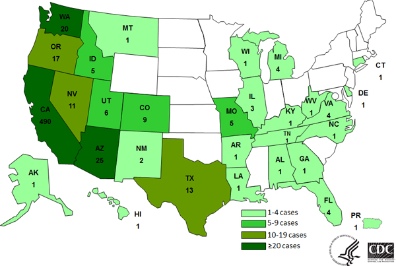The Centers for Disease Control and Prevention (CDC) has stated that the Salmonella Heidelberg outbreak linked to Foster Farms chicken appears to be over. This outbreak sickened at least 634 people in 29 states and Puerto Rico from March 1, 2013 to July 11, 2014. Since the last update on July 4, 2014, 13 more people were reported ill in California (10) and Illinois (3). Epidemiological and traceback investigations indicate that Foster Farms brand chicken was the source of this massive outbreak.

The final case count by state is: Alabama (1), Alaska (1), Arkansas (1), Arizona (25), California (490), Colorado (9), Connecticut (1), Delaware (1), Florida (4), Georgia (1), Hawaii (1), Idaho (5), Illinois (4), Kentucky (1), Louisiana (1), Michigan (4), Missouri (5), Montana (1), Nevada (11), New Mexico (2), North Carolina (1), Oregon (17), Puerto Rico (1), Tennessee (1), Texas (13), Utah (6), Virginia (4), Washington (20), West Virginia (1), and Wisconsin (1). Most of the patients (77%) live in California. Using the Salmonella multiplier of 30.3, which officials use since these outbreaks are notoriously underreported, that means 19,120 people were sickened.
Thirty-eight percent of patients were hospitalized, which is double the normal rate, because four of the seven outbreak strains of Salmonella Heidelberg bacteria were resistant to several antibiotics. And 15% of patients developed blood infections, a serious condition, as a result of this infection. That is triple the usual number in a typical Salmonella outbreak. No deaths were reported.
A recall was finally issued related to this outbreak after the USDA identified one of the outbreak strains or bacteria in an intact sample of Foster Farms chicken taken from the home of a person who was sick with the same strain. This chicken could still be in home freezers. Check the recall list carefully. If you have this chicken in your home, discard it immediately in a closed container, or return to the place of purchase for a refund. Wash your hands after handling the package.
The number of Salmonella infections has returned to the baseline expected for this time of year. But chicken continues to be a risky product. The CDC has issued advice to consumers, which states that you should treat raw poultry as if it were contaminated. Always separate raw poultry from other items. Wash your hands, cutting boards, utensils, countertops, and dishes with hot soapy water after working with raw chicken. Never wash raw poultry before cooking, since that can cause the bacteria to aerosolize and spread around the kitchen.
Always use one cutting board for fresh produce and another for raw chicken. Never place cooked food on a plate that previously held raw meat. Always cook poultry to a safe final temperature of 165°F as measured with a meat thermometer. And chill food promptly, refrigerating or freezing leftovers within 2 hours.




